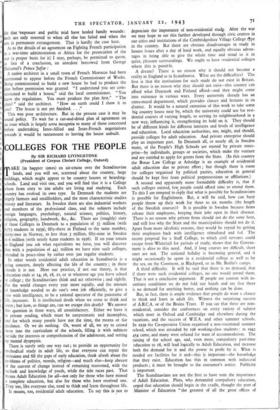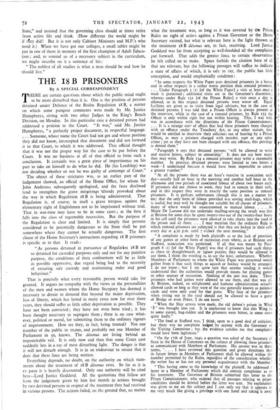COLLEGES FOR THE PEOPLE
By SIR RICHARD LIVINGSTONE (President of Corpus Christi College, Oxford)
AKE (in happier times) an air-cruise over the Scandinavian lands, and you will see, scattered about the country, large buildings, which might appear to be country houses or boarding- schools. Land and visit one, and you will find that it is a College where from sixty to 200 adults are living and studying. Each country has evolved its own type. In Denmark the students are largely farmers and smallholders, and the most characteristic studies history and literature. In Sweden there are also industrial workers and members of the professional class, and the subjects include foreign languages, psychology, natural science, politics, history, religion, geography, handwork, &c., &c. There are (roughly) sixty of these Colleges in Denmark to a population of 34 million (with 6,773 students in 1939), fifty-three in Finland to the same number, thirty-two in Norway, to less than 3 million, fifty-nine in Sweden to 6 million (with nearly 6,000 students in 1936). If on your return to England you ask what equivalents we have, you will discover that with a population of 444 million we have nine such colleges, attended in peace-time by rather over Soo regular students.
In other words residential adult education in Scandinavia is a going concern, deeply affecting the life of the country ; in these islands it is not. Here our practice, if not our theory, is that education ends at 14, 16, 18, 21, or at whatever age you leave school or college ; the Scandinavians think and act otherwise ; and rightly. For the world changes every year more rapidly, and the amount of knowledge needed to do 'one's own job efficiently, to give a vote with intelligence, to be a rational spectator of the panorama of life, increases. It is intellectual death when we cease to think and learn ; but how, as things are, can we escape this death? We answer this question in three ways, all unsatisfactory. Either we leave it to private reading, which must be unsystematic and incomplete, Ind for which many people have not the time, the means or the 2.inclance. Or we do nothing. Or, worst of all, we try to crowd more into the curriculum of the schools, filling it with subjects utside the interests or comprehension of the-adolescent, and setting
❑ p mental dyspepsia.
There is surely only one way out ; to provide an opportunity for methodical study in adult life, so that everyone can repair the omissions and fill the gaps of early education, think afresh about the problems of politics, morals, religion—and much else—keep abreast of the current of change instead of remaining marooned, with the outlook and knowledge of youth, while the tide races past. That means Adult Education for all—not only for those who have missed a complete education, but also for those who have received one. They too, like everyone else, need to think and learn throughout life.
It means, too, residential adult education. To say this is not to depreciate the importance of non-residential study. After the war we may hope to see this further developed through civic centres in our cities and institutions of the Cambridgeshire Village College type in the country. But there are obvious disadvantages in study in leisure hours after a day of hard work, and equally obvious advan- tages in being able to give the whole time and mind to it in quiet, pleasant surroundings. We ought to have residential colleges where this is possible.
A dream? There is no reason why it should not become a reality in England as in Scandinavia. What are the difficulties? The .first is that the institutions for such study do not exist in Britain. But there is no reason why they should not exist—this country can afford what Denmark and Finland afford—and they might come into existence in various ways. Every university already has an extra-mural department, which provides classes and lectures in its district. It would be a natural extension of this work to take some big country house near by, which the university could use for resi- dential courses of varying length, so serving its neighbourhood in a new way, influencing it, strengthening its hold on it. They should be of different kinds for different interests and levels of intelligence and education. Local education authorities, too, might, and should, provide colleges for adult edUcation. And private enterprise should play an important part. In Denmark all, or nearly all, in Sweden many, of the People's High Schools are started by private enter- prise—by individuals, groups or societies, which make the venture and are entitled to apply for grants from the State. (In this country the Bonar Law College at Ashridge is an example of residential adult education due to private effort ; but though there is room for colleges "organised by political parties, education in general should be kept free from political prepossessions or affiliations.) A second and apparently more formidable difficulty is, that if such colleges existed, few people could afford time to attend them. To this I am tempted to reply that what is possible for Scandinavians is possible for Englishmen. But, it will be said, how can busy people throw up their work for three to six months (the length of the Swedish courses)? It is possible in Sweden because firms release their employees, keeping their jobs open in their absence. There is no reason why private firms should not do the same here, and still less why the State and the municipalities should not do it. Apart from more idealistic reasons, they would be repaid by getting their employees back with intelligence stimulated and fed. The recent proposal for a Staff College, to which civil servants could escape from Whitehall for periods of study, shows that the Govern- ment is alive to this need. And, if long courses are difficult, short ones are not. The national holiday is becoming general, and it might occasionally be spent in a residential college as well as by the sea, on the Continent, at Blackpool, or in Mr. Butlin's camps.
A third difficulty. It will be said that there is no demand, that if there were such residential colleges, no one would attend them. That is not a conclusive argument. If people are content with in- sanitary conditions we do not fold our hands and say that there is no demand for anything better, and nothing can be done.
But, in fact, there is ample evidence that people do want a chance to think and learn in adult life. Witness the surprising success of A.B.C.A. or of the Brains Trust. If you say that these are non- residential, consider the conferences on every variety of subject which meet in Oxford and Cambridge and elsewhere during the vacations, and the success of W.E.A. and other summer schools. In 1939 the Co-operative Union organised a non-vocational summer school, which was attended by 198 working-class students: in 1942 454 came, and many were refused for want of accommodation. The raising of the school age, and, even more, compulsory part-time education to 18, will lead logically to Adult Education, and increase both the demand for it and the power to profit by it. What is needed are facilities for it and—this is important—the knowledge that they exist. Educalion has this in common with industrial products ; it must be brought to the consumer's notice. Publicity is important.
The Scandinavians are not the first to have seen the importance of Adult Education. Plato, who demanded compulsory education, urged that education should begin in the cradle, thought the post of Minister of Education " the greatest of all the great offices of State," and insisted that the governing class should at times retire from active life and think. (How different the world might be if tliey did! But it is not only Cabinet Ministers and M.P.'s who need it.) When we have got our colleges, a small tablet might be put in one of them in memory of the first champion of Adult Educa- tion ; and, to remind us of a necessary subject in the curriculum, we might inscribe on it a sentence of his: " The noblest of all studies is what a man should be and how he should live."



























 Previous page
Previous page